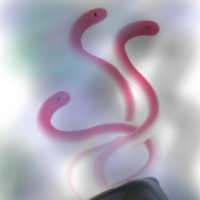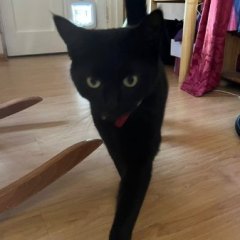All Activity
- Past hour
-
Tooth
-
I am fortunate to be in a position where money is not something me or my family have to worry about (I live with my parents still). my family have always said that there will always be a place for me here. That kinda makes it harder for me to justify in my mind when applying for some jobs. I don't have the option to tell myself "well, I really need the money". Volunteering is an option, but I would really like to start earning money. I did look for jobs at charities and NGOs and unfortunately there just aren't any applicable jobs in my area. In regards to what I was asking for, I was hoping that someone may have compiled a list of tips for people with OCD and looking for a job. I have told my mum that I'm struggling since posting this so hopefully we can work something out. might go to the doctors too since I feel I've been suffering in lots of little ways since my CBT which I just don't remember anything of.
-

Am I doing this right?
ocdsufferer85 replied to ocdsufferer85's topic in Obsessive-Compulsive Disorder (OCD)
I am beginning to see I have no control over these horrible attacks, I don't ask for them, I shouldn't be living worried about when it'll next "get me" I don't want any of these thoughts in my head, and yes I agree when stressed this is when they get even worse! It's a horrible illness but when you're already down it likes to jump in and make it twice as hard to get back up. I hate the fact it is always lurking but I'm trying to just trust that it is illness. -
Unknown bottle/chemical fears
Christina replied to Christina's topic in Obsessive-Compulsive Disorder (OCD)
Thanks for sharing Simonsky. I do get you on this. "Bathed in that stuff" - exactly the feeling. We have to remember that we have a very creative imagination. - Today
-
Sorry to hear you're struggling again. As well as reaing it's head in times of stress, OCD also seems to crop up when we start to feel like we're gaining control. By keeping some of our compulsions 'we leave the door open' so to speak. Be kind to yourself, accept that you're having a set back, however there's no reason why you can't get back to where you were again. Could you maybe try delaying or reducing the compulsions....small steps, to try and break the cycle? Get busy, make a plan for your day. It is draining, so be kind to youself, indulge in something you enjoy.
-
Am I doing this right?
Bev53 replied to ocdsufferer85's topic in Obsessive-Compulsive Disorder (OCD)
I think @snowbear mentioned in a post the other day something along the lines of 'it's an OCD worry, it happened because I was stressed, I don't need to give it any more attention'. I think that's the key. Then get busy with your day. Honestly, it does get easier. -
Hi everyone, It’s been a long time since I needed to post here but I am massively struggling at the moment. Things have got bad over the last week or so and I don’t know how to break the cycle. I had been managing my ocd for a while. By no means had it gone but I was able to work around the checking, counting, repeating actions until they felt ‘right’ but the last week I have been having to do so much more. I don’t know what’s changed or even how I managed to get it to fade before but I’m worn out both mentally and physically. I just wanted to share with people who understand xxx
-
I can't really comment on the OCD itself as this is still something im struggling to get my head around myself. However, I feel this in particular. Something I have noticed is that if I’m tired, worn down or stressed in general OCD affects me far more than normal. The same can be said of if I haven’t been outside for a while or eat particularly well. Having lived up to the last few years with little to no exercise, staying up too late and eating whatever I want with no consequences, I’m beginning to realise looking after yourself is actually critical in talking OCD. I guess what im trying to say is, don't forget to look after yourself. Despite the OCD.
-
Unknown bottle/chemical fears
Simonsky replied to Christina's topic in Obsessive-Compulsive Disorder (OCD)
With my contamination OCD I would probably have had a,similar response to you @Christina. Often the contamination fear that OCD creates can be based on mere proximity which OCD then whips up into the feeling one has bathed in the stuff. For example, a few days ago in the city centre I got off the bus and near the stop there was a rubbish bin which had something around its base that looked like vomit. I didn't step in it but because of proximity I felt it was on my shoes and I was spreading it everywhere. I managed to avoid the compulsions around disinfecting my shoes (which would have caused other compulsions around the disinfectant ). In fact it might not have been vomit but a discarded take-away. So I think your fear is around the proximity issue. I often cross roads to avoid walking past skips in case they have some questionable materials in them. So now the OCD is telling me that because I related the story about the possible vomit it makes it more likely it was vomit, the OCD madness never ends. "Yer gorra laff" as the late Cilla Black might have said. Thuogh OCD ain't funny. -
ocdsufferer85 started following Am I doing this right?
-
Just wanted to check in as I've been trying to avoid rumination the last few days or so, obviously there's always a sense of ocd lurking, waiting to set me back and make me feel worthless, I feel like it's very very easy for it to bring me right down, is this normal when battling it at first? Some days I feel more rational and logical other days I just don't know what is realistic and anxiety comes on super bad again. I have tried to come to a logical brief mantra in my mind and I hope I'm doing it correctly. I have narrowed it all down to a short brief set of lines in my mind when it strikes, I try to cut it off and distract. It's hard. - I got frustrated - normal human emotion especially under stress and when anxious. The situation I was in was the only reason for it to even begin. - Ocd came in to make things worse - not my fault. - which in turn set off more thoughts and visuals in my head - can't control this. - then I had a reaction, unplanned, super in the moment, no intention. - now ocd is questioning me about what I did, it made me go from "normal" to suddenly fearing I'd done the worst, creating immediate doubt and making me question everything instantly, a slight reaction to a thought which was automatic in the situation and it's got me feeling so guilty. - i couldn't stop these thoughts, images, and responses they were over so quickly and if it was intentional I'd know exactly what happened and what I wanted out of the situation, but none of this was intentional or wanted in any way. - if we think things we don't mean in a moment of anger it's not the end of the world no matter the subject, it's something we can't control 24/7. - i haven't changed who I am or what's in my heart in a split second, I didn't become a different person just because ocd decided to attack. i know i said brief haha but this is just it fully explained, i try not to delve too much into it and am trying to trust the professionals etc. i hope this is right.
-
They shouldn't be expecting you to be calm while doing exposure therapy. The whole point is to trigger your anxiety.
-
Yes you've got it...sorry I should have said you can change the letters around in the word if you want to, but only include 1 new one My next word is: Peas
-
High Intensity Practitioner
Nick1964 replied to Nick1964's topic in Obsessive-Compulsive Disorder (OCD)
Thankyou Handy for your very thorough reply. -
In all walks of life there will be moral dilemmas. There are certain jobs that I would rule out in say the unofficial job market such as being a mercenary or being a member of a criminal gang dealing in drugs. Most people work to get money to put a roof over their head and food in their belly. Most of world does not have social security systems and if the extended family system cannot provide money then the future can be quite bleak. Why not begin by volunteering in a organisation whose cause you consider moral? I did a lot of volunteering when young when the organisation provided food and shelter. I learnt a lot. There will still be moral dilemmas. Such volunteering will build your CV and provide references for gainful employment.
-
Sending best wishes eco This can be very isolating, so try to be kind to yourself and remember, there's plenty of us out here battling alongside you ️
-
Emmm, not 1,800 on this topic Handy. Do whatever helps you ecomum whether posting, helping others or reviewing.
-
Ok I think I get it… Heap
-
I’m confused To change Balm into Beam you have to change two letters. And Team into Time…
- Yesterday
-
I may be reading you wrong but it sounds like you're hoping for some sort of job centre or employers register that guarantees the job is moral? Simple answer is no. There is no such resource. Keep in mind that the problem isn't with the jobs you're considering, but with your own skewed OCD thinking. Getting a job you're able to do will require you to correct your thinking. Or to live with some mental discomfort as you get on with the work in spite of feeling that it is impacting on you morally. The good news is that if you do get a job and keep at it in spite of your OCD thoughts those thoughts that it is making you immoral will fade and disappear in time. So your best possible 'exposure therapy' would be to get a job, even if your thinking convinces you there's something immoral about it.
-
Sweet
-

Magical Thinking & Promises
snowbear replied to Chris32's topic in Obsessive-Compulsive Disorder (OCD)
They are still compulsions. The thinking that you have to keep your 'promises' is also a compulsion. The difference between a morally good person 'keeping their promises' because it's the right thing to do and the OCD compulsive behaviour of 'keeping your promises' is that the 'promise' you are keeping is pointless and unnecessary behaviour. Keeping a promise is about not letting someone else down. The only person you are looking out for with your compulsive promises is yourself. It will help you to resist giving in to them if you label them correctly as compulsions rather than thinking of them as promises. -
Sugar
-
It is just your new theme. This theme is going to change too, most likely to one of the other prevalent OCD themes. You're stuck on thoughts of children & as you know, it's not a good thing to be stuck on.
-

High Intensity Practitioner
Handy replied to Nick1964's topic in Obsessive-Compulsive Disorder (OCD)
Sure, therapy with a High Intensity Practitioner (HIP) is absolutely a common and highly recommended approach for Obsessive-Compulsive Disorder (OCD) therapy. Here's why and what it entails for OCD: * Evidence-Based Treatment: The gold standard for OCD treatment is a specific type of Cognitive Behavioral Therapy (CBT) called Exposure and Response Prevention (ERP). High Intensity Practitioners are specifically trained in delivering this evidence-based intervention. * ERP is Key: * Exposure: This involves gradually and systematically exposing yourself to the thoughts, images, objects, or situations that trigger your obsessions and anxiety. * Response Prevention: Crucially, this involves preventing yourself from engaging in your typical compulsive behaviors (rituals) that you would normally do to reduce your anxiety. The idea is to break the cycle of obsession-compulsion and learn that the feared outcome doesn't happen, or that you can tolerate the anxiety without performing the compulsion. * Why a HIP for OCD? * Complexity: OCD can be highly complex and distressing. HIPs are equipped to handle the intensity of symptoms and the challenges that arise during ERP. * Structured and Intensive: ERP is a very structured and often intensive therapy. HIPs guide you through this process, which can be quite difficult and requires a lot of support and encouragement. * Skill and Expertise: Delivering effective ERP requires specific skills, including: * Careful assessment and formulation of your specific OCD symptoms. * Designing a personalized hierarchy of exposures, starting with less anxiety-provoking situations and gradually moving to more challenging ones. * Helping you identify and resist subtle compulsions (mental rituals, avoidance behaviors). * Providing in-session coaching and support during exposure exercises. * Teaching you how to manage the anxiety and discomfort that arises without resorting to compulsions. * Monitoring and Adjustment: HIPs continuously monitor your progress, adjust the ERP plan as needed, and help you troubleshoot any difficulties you encounter. What OCD therapy with a HIP might look like: * Detailed Assessment: The therapist will conduct a thorough assessment to understand your specific obsessions, compulsions, and how they impact your life. * Psychoeducation: You'll learn about OCD, how it works, and why ERP is effective. Understanding the mechanisms behind your symptoms can be empowering. * Hierarchy Development: You and your therapist will create a "fear hierarchy" or "exposure hierarchy" – a list of situations or thoughts related to your OCD, ranked from least to most anxiety-provoking. * In-Session and Homework Exposures: You'll engage in exposure exercises both in therapy sessions with the therapist's guidance and as "homework" between sessions. This is where the real work happens. For example: * If you have contamination OCD, an exposure might involve touching something you perceive as "dirty" and then refraining from washing your hands. * If you have checking OCD, an exposure might involve leaving your house without checking the locks multiple times. * If you have intrusive thoughts, an exposure might involve intentionally bringing those thoughts to mind without trying to suppress or neutralize them. * Preventing Compulsions: The core of ERP is the "response prevention" part. The therapist will help you identify and resist your compulsions, even when your anxiety is high. * Relapse Prevention: As you make progress, the therapist will help you develop strategies for maintaining your gains and preventing future relapses. In summary, if you are seeking therapy for OCD, a High Intensity Practitioner who is skilled in Exposure and Response Prevention (ERP) is an excellent choice. This is the most effective and evidence-based treatment for OCD.





